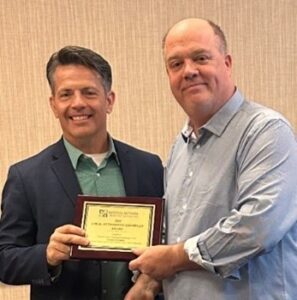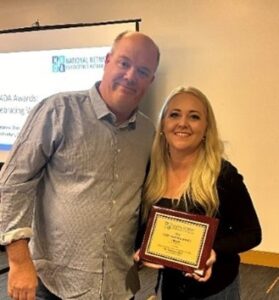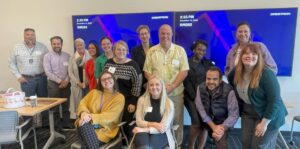A Message from Alex Medler
It was wonderful to see so many of you in Oakland last month.
Coming out of the NN4DA Annual Meeting and a great NACSA Conference (full of NN4DA partners leading important sessions), I was reminded of how important it is for people to come work together -- face-to-face. The deep and substantive discussions were matched by people connecting across states to find common concerns and explore one another’s perspectives and solutions.
As the items below show, our state partners regularly convene busy professionals locally. While it is the meaty substance of authorizing that motivates this work, all our local and national networks and groups would never succeed if we weren’t also helping to connect with our friends and peers -- rejuvenating one another with personal connections and a shared appreciation of the value of professional community.
This NN4DA Update includes announcements of awards and accomplishments of our state partners and their members, resources and materials from our meeting in Oakland, updates on recent research and legal issues in the field, and upcoming state events.
________________________________________
NN4DA Inaugural Awards
The NN4DA recognized authorizers and state partners during the NN4DA Annual Meeting with an inaugural set of awards. Three leaders were recognized for their contributions.
- Corey Loomis, the Charter Schools Director of the Riverside County Office of Education (RCOE), was recognized with the Local Exemplar Authorizer Award. Under Corey's Leadership, RCOE is setting an example of forward-thinking authorizing, with excellent authorizer-charter schools relationships at the cutting edge of new, well-rounded approaches to oversight.
- Kia Sweeney Scott, the Senior Director, School Choice Services at Orange County Public Schools and board President of the Florida Association of Charter School Authorizers (FACSA), received the Community Contributor Award for her leadership and regular contributions and help to FACSA and her colleagues in Florida's authorizing community,
- Mackenzie Khan, Executive Director of the Colorado Association of Charter School Authorizers (CACSA), received the State Impact Partner Award for her successful work expanding CACSA to affect more Colorado authorizers and providing direction and vision for the work in Colorado.


_________________________________________________
Comprehensive List of Authorizer Tools and NN4DA Meeting Materials Available Online
A summary document with model resources from the NN4DA State Partners is now available. The document provides links to resources from NN4DA Primary and Incubating State Partners and covers tools that authorizers can use throughout the life cycle of a charter school.
A wealth of concrete tools in this document allows authorizers in any state to explore what their colleagues are doing with similar issues around the country. The draft document is currently available online here. Thanks to Kenlyn Newman from CACSA for initiating this wonderful resource.
The deck of presentation materials from the full NN4DA Annual Meeting is available online. The deck includes information on all topics covered in the annual meeting agenda. Topics include substantive issues like declining enrollment, federal Charter School Program requirements and their implications for authorizing locally as well as organizational strategies around topics like district engagement and fee-for-service work.
_____________________________________________
National Study Examines Charter Sector Performance using NAEP to Rank State Charter Sectors
A new study by Paul Peterson and M. Danish Shakeel of Harvard compares academic performance in charter schools across states using data from the National Assessment of Educational Progress (NAEP). The study found:
The top-performing states are Alaska, Colorado, Massachusetts, New Hampshire, New York, Oklahoma, and New Jersey. The lowest-ranked charter performance is in Hawaii, followed by Tennessee, Michigan, Oregon, and Pennsylvania. Students in the South tend to perform above average, while midwestern Rust Belt states rank at the midpoint or below. We also find that students at schools run by charter networks outperform students at independent charters, on average. Students at schools run by for-profit organizations have lower scores on NAEP, on average. Students at charters authorized by state education agencies have higher scores than those authorized by local school districts, non-educational organizations, or universities.
The study is described in a brief article in The 74, a longer description in Education Next, and the full study is available online.
__________________________________________________
Religious Charter School Developments
Catholic Charter School Contract Approved in Oklahoma while Guam School to Open as Non-Religious School
Developments continue related to religious charter schools. Last month, the Oklahoma Virtual Charter School Board approved the contract for a Catholic virtual school, which is expected to open in the fall of 2024. A lawsuit has been filed seeking to prevent the school from opening. In Guam, where a new state law had allowed existing private religious schools to convert to charter status, a religious school that had planned to become a religious charter instead decided to open as a non-religious charter school.
Legal Scholars Analysis of State Actor Status and Strategies for Policy Change
Legal scholars Preston Green and Suzanne Eckes analyzed the legal background of religious charter schools in a recent law review article, which is also described in this shorter piece. Green and Eckes argue that state charter law language declaring charter schools as public schools is less important than how the courts treat them. According to the authorizers, the key question is:
not what state law says but whether charter schools function as "state actors" in the same way as traditional public schools.
If they do, they are subject to the same constitutional constraints as government entities. But if they aren’t state actors, Green and Eckes say, courts could rule that charter schools, like private schools, have a First Amendment right to teach religion and to serve only students and families that meet their standards.
Colorado Legislation Reinforces State Actor Status
Acting in a similar line of legal reasoning, this past year, Colorado passed legislation that moved the state in the direction that Green and Eckes recommend. The new statutory language from Colorado was the topic of the NN4DA Working Group on the Public Nature of Charter Schools meeting in October. Colorado attorney, Bill Bethke described the new bill to NN4DA members and provided this summary of the Colorado bill. The bill clarifies that Colorado charter boards are governmental entities and charter board members are public officials. Charter board members were also required to take an oath of office like other government officials. This change acts on ideas that Green and Eckes describe in the article above, and could eventually protect Colorado charters from challenges to their status as state actors.
_______________________________________
State Partner Events
FACSA Monthly Meeting
The November FACSA Monthly Meeting is scheduled for Friday, November 17, from 9:00 am to 11:00 am Eastern. This month's meeting will be remote, and authorizers from other states are welcome to login and join. To attend, register here. Topics this month include mental health and behavioral health assessments.
NN4DA Public Nature of Charters Work Group
This group meets on the last Monday of each month at 2:00 pm Mountain Time. The next meeting is Monday, November 27. The group discusses developments related to the legal and policy issues around the public nature of charter schools, including religiously affiliated charter and religious charter schools. Contact Alex Medler for more information on this group, which meets via Zoom:
Meeting ID: 870 7905 8665
Passcode: 214126
CACSA Bootcamp Materials Available
CACSA convened an in-person boot camp in November in Castle Rock, Colorado. The compressed agenda covered key issues in the life-cycle for charter schools and shared content from CACSA's resource bank for new authorizers. All materials for the boot camp are available online at the CACSA Website.

